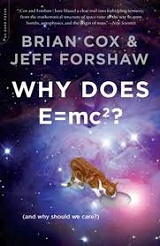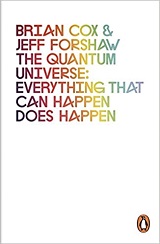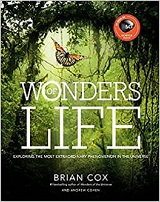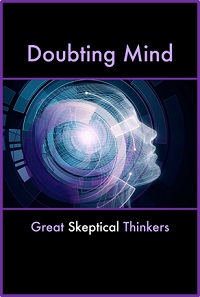|
TRANSLATE THIS ARTICLE
Integral World: Exploring Theories of Everything
An independent forum for a critical discussion of the integral philosophy of Ken Wilber
 David Christopher Lane, Ph.D.
Professor of Philosophy, Mt. San Antonio College Lecturer in Religious Studies, California State University, Long Beach Author of Exposing Cults: When the Skeptical Mind Confronts the Mystical (New York and London: Garland Publishers, 1994) and The Radhasoami Tradition: A Critical History of Guru Succession (New York and London: Garland Publishers, 1992). David Christopher Lane, Ph.D.
Professor of Philosophy, Mt. San Antonio College Lecturer in Religious Studies, California State University, Long Beach Author of Exposing Cults: When the Skeptical Mind Confronts the Mystical (New York and London: Garland Publishers, 1994) and The Radhasoami Tradition: A Critical History of Guru Succession (New York and London: Garland Publishers, 1992).
DOUBTING MIND
Great Skeptical Thinkers
Susan Blackmore |
Brian Cox |
Martin Gardner |
Sam Harris |
Christopher Hitchens |
Harry Houdini |
Ray Hyman |
Phillip J. Klass |
Joe Nickell |
James Randi |
Adam Savage |
Eugenie Scott
BRIAN COXTyler Cardena-WagersBrian Cox is world-famous physicist, author, and television personality. He is a prominent contemporary skeptic, often using his many public outlets to candidly address questions about science, God, and climate change in the hopes of encouraging people to think for themselves. Brian Edward Cox was born March 3, 1968 in Oldham, Greater Manchester, England to banker parents. As a child, he participated in dance and gymnastics and attended the Hulme Grammar School in Oldham. When he was 12, he read the book Cosmos by Carl Sagan who he now calls —a great hero” of his. In his teens, Cox taught himself the piano with the intention of becoming a “pop star”; he recalls in an interview with ABC (Australian Broadcasting Corporation): “I'd always wanted to be a scientist, particularly an astronomer, as far back as I can remember, so all the way through school I just knew I was going to be a Physicist. Then around the age of 15 or 16 I decided I wanted to be a pop star—it wasn't as if I was a musician. So I taught myself to play really in order to be a pop star—it's the dream that you have when you're 16. Then, accidentally, it happened for a while. So I had a brief break then I went back to university when I was 23.” He was successful, playing keyboards for the English rock band Dare, and Northern Irish pop band D:Ream, with the latter landing several hits on the UK charts. Cox's return to education was studying physics at the University of Manchester, completing his B.S. and M.Phil in physics, and his Ph.D. in high-energy particle physics. Brian Cox Cox married American-British, television presenter and writer Gia Milinovich in Duluth, Minnesota in 2003. In 2009, she gave birth to Cox's first son. Cox has conducted research at both the HERA and LHC particle accelerators and authored hundreds of scientific publications. He has also co-written several books with physicists Jeff Forshaw and Andrew Cohen, notably, Why Does E=mc2? and The Quantum Universe. He is now a professor of particle physics in the School of Physics and Astronomy at the University of Manchester, and appears on several television programs (many on BBC) about science and cosmology. He has also been a guest speaker at several TED conferences, and toured globally giving talks to live audiences about physics and cosmology. He is widely recognized for his ability to make complicated science accessible for the layperson. In 2010, Cox was honored with the Most Excellent Order of the British Empire (OBE) chivalry award. And, in 2016, he was granted the Fellowship of the Royal Society (of London) award, recognizing him for making a “substantial contribution to the improvement of natural knowledge”. Cox's consistent appearances on television, radio podcasts, and at conferences have granted him science-celebrity status, the likes of which Stephen Hawking, Carl Sagan, Richard Feynman, and Neil deGrasse Tyson have experienced. Cox is a prominent cosmologist (“the scientific study of the origin, evolution, and eventual fate of the universe”) and regularly uses his publicity to advocate for learning about “our place in the universe” to better answer fundamental questions like “Why are we here?” He is outspoken about his stances on several controversial topics, several of which are cited below.
God & ReligionCox has stated that he does not believe in God, although he has rejected the title 'atheist'. He steps carefully around the topics of God, religion, and spirituality, admitting in an interview with Joe Rogan: “I'm always careful … science can sometimes sound arrogant; it can sound like the discipline of telling people 'you're not right', and it's not that. It's the discipline of saying 'this is what we found out'. If you want to philosophize or do theology, you have to operate within that framework because it's just an observational framework. It's important to be humble when you're talking about science ... It's not able to answer ultimate questions at the moment … Religion is a natural thing, you see it across the world in all different cultures, but I think that in the 21st century, religion needs to operate within that framework if it's going to operate. I don't think the problem comes when your theology or your philosophy forces you to deny some facts—some measurements. These things are measurements; it's not my opinion the universe is 13.8 billion years old, we measured it. People say the Earth's flat or whatever, it isn't, and we've measured it, so just stop it. But that doesn't mean you can't be spiritual and you can't be religious, I would say, it doesn't mean you can't believe in God or Gods, that's not ruled out.” In another interview with ABC, he comments on the supposed 'incompatibility' of science and religion, emphasizing that: “I don't believe in a God, however, I don't like the antagonism that occurs or is produced by this question. What you can say if you're a cosmologist—what you should say—is 'we know that the universe was very hot and dense 13.8 billion years ago; we don't know how it got hot and dense', 'we don't even know, actually, if the universe had a beginning in time', 'we don't know.' Science starts for me with 'I don't know' … I don't believe there's any evidence for a creator, however, there certainly isn't no-evidence … We're stepping into an area where we [scientists] don't need to be … The last thing that we should do is close off that possibility of someone being a scientist because someone has faith.” Paranormal IdeasCox's explains the paranormal as a combination of apophenia, our tendency to connect unrelated phenomena, and our inability to deal with unexplainable perceptions, stating in an interview with British talk show host Lorraine: We're bad, as human beings, at understanding coincidences. So when something happens to me … and there's a full moon up there [for example], we tend to attach more to that than there is … It's interesting; it's about our perception. We're making so many measurements of the world and seeing and processing different things in our remarkable brains and sometimes something doesn't quite go according to plan; something strange happens and we attach a great deal of weight to those things. So I think as far as we can tell, and as far as we understand the science—and we understand science very well—no [ghosts aren't real]. Climate ChangeIn response to the question “What does science have to do to win over non-believers?” by the South China Morning Post, Cox replies: “The great challenges that we face as a civilization, have, if not scientific answers, then require a scientific framework to answer. Climate change is arguably the number one challenge that we will face in the decades to come and the answers are political, 'what do you do about it?' There are many choices that we can make—from investing in different energy sources, to quite radically cutting down on aviation. These are extremely difficult choices that we'll have to make, so science isn't going to answer that, but what it does is provide the framework within which we have to think. If we continue to put this number of greenhouse gasses into the atmosphere, for this long, then what do we think will happen? The challenge is [getting] people to understand the difference between the framework, which is the science—our best understanding of nature—and the political response which is the province of people and governments.” He adds in an interview with The Guardian: “Don't undermine the science just because you don't like the economics. That's a dangerous slope, because the problem of course is you're not undermining just that, you're undermining the basis of rational decision-making in society.” VaccinesCox believes the 'anti-vax movement', as it has been called, is not only very dangerous, but undermines one of the greatest human achievements, and could unnecessarily reintroduce previously eradicated diseases, articulating in conversation with Tristram Clayton of the New Zealand Herald: “[The anti-vax movement is] extremely dangerous; baffling to me. One of the great human achievements was the eradication of smallpox through a worldwide, coordinated vaccination program. I suppose the argument is some kind of 'freedom to choose' argument and it's true, the psychology is relatively easy to understand (because I'm a parent) and the idea that you will actively do something to your child which is slightly unpleasant to them [take them to the doctor and have them vaccinated]; I could see how you might say 'I'd rather not do that', but the point is, it's clear that these childhood diseases that we've largely eradicated are going to rise back again if, as a society, we don't properly vaccinate our children.” Cox consistently echoes one sentiment in every statement he makes; the same sentiment which has defined his work and mission: the need for us as a society to respect science. Not to accept science as absolute truth, but to acknowledge that it's the most reliable source of information we have. This would require all of humanity to begin to think critically—not to abandon its beliefs, but realize that those beliefs must synergize with what we have observed objectively. Science provides us the framework with which to begin answering difficult questions. Parallel to this sentiment is what Cox believes is the “biggest threat to civilization” which he outlined in the same NZH interview: “I think the biggest threat to our civilization at the moment is the disconnect in democratic societies between fact or data—our attempt to predict what will happen in the future—and the understanding of our electorates. Carl Sagan, a great hero of mine who saw this, wrote a great book called The Demon Haunted World: Science as a Candle in the Dark and in it he said he could imagine a time in his worst nightmares—in his grandchildren's generation—where, in our societies, that are entirely based on science and engineering, there's a disconnect between the majority of voters and their understanding of that society and the way society actually works … If you take one of the great issues of the day, climate change, what you see there is a mistrust of modeling. What troubles me is that there's a reaction about this way of thinking [modeling] which is the best we can do. And, if you get a reaction against that, it becomes very difficult for sensible policy to be made.” His solution is an easy answer to give, but difficult to implement: education! We need to equip citizens in our societies to be able to differentiate between false propaganda and facts. Fact is a difficult thing for scientists because there are no absolute truths in science. The valuable currency in today's societies is trust—who do you trust, which voices do you trust? Further Reading1. Why Does E=mc2? (And Why Should We Care?), Da Capo Lifelong Books; 37446th edition (July 13, 2010) 2. The Quantum Universe: Everything That Can Happen Does Happen, Penguin Books Ltd (UK) (21 juni 2012) 3. Wonders of Life: Exploring the Most Extraordinary Phenomenon in the Universe (Wonders Series), Harper Design (May 7, 2013)    PREFACE | David Christopher Lane
Before the current pandemic altered our day to day lives, the MSAC Philosophy Group had been working on a book entitled, Doubting Mind: Great Skeptical Thinkers, which contained separate essays on a number of notable researchers who champion critical thinking and skepticism when analyzing paranormal claims, such as UFOs, astrology, and various religious claims. The book has now been finished, though it took a bit longer than we anticipated. The word skeptical has too often been conflated with the word cynical. The former term comes from the Greek word skepsis which properly defined means "to look, view, observe." Or, as Miguel de Unamuno explained in 1924 in his book, Essays and Soliloquies, "Skeptic does not mean him who doubts, but him who investigates or researches as opposed to him who asserts and thinks that he has found." To be cynical, on the other hand, indicates that the person is "[pre] disposed to disbelieve or doubt the sincerity or value of social usages or personal character or motives and to express it by sarcasm and sneers, disparaging of the motives of others, captious, peevish." Therefore, it is important to understand that a skeptic is not one who ad hoc dismisses borderland ideas, but is one who is willing to go the extra mile to gather more (not less) information about any given phenomenon. As I have often remarked (to the obvious consternation of certain cult followers), we, humans, are too gullible when we accept miraculous claims without further investigation. We are cheap sluts for the paranormal, believing too easily in conspiracy theories that defy the known law of physics. There are many reasons why this is so, but I suspect that in a world where everything eventually eats one another to survive (whether it be a vegan eating plants or a carnivore eating meat), any organism that can develop a buffering illusion to survive such a horror show has an evolutionary advantage over others that cannot. This came into sharper relief for me this past week as I watching the British made television mini-series, War of the Worlds, where in one particularly poignant scene a mother who has just witnessed the death of her children at the hands of an alien species realizes that there is no point in continuing to live in such a horrific environment. She opts to shoot herself and the viewer instead of being shocked perfectly sympathizes with her decision. Nature is a madhouse if looked at objectively and therefore it is not surprising that we have evolved all sorts of mental defense systems in order to live long enough on terra firma to pass on our genetic heritage. Since we are the survivors in this boiling cauldron of eat or be eaten, we have inherited a variety of tools to ward off the true existential dread that can overcome any being that becomes too keenly aware of how this DNA game plays out. I mention all this as a necessary preface, since no matter how well versed we may become in science (and trained to become good doubters, in the positive sense of that term), we still retain at the core of our beings a deeply emotional component that defies a purely rational or logical way of being. We may act like scientists from time to time, but we are not scientists in the long term. We are vulnerable creatures and our myths and our fairy tales will persist even if we opt for agnosticism or atheism, though they may take on a different color and hue and justifications. Thus, this book provides us with but a small glimpse of how to think more rationally and critically, despite the sobering realization that we cannot be great skeptics all the time.
Comment Form is loading comments...
|